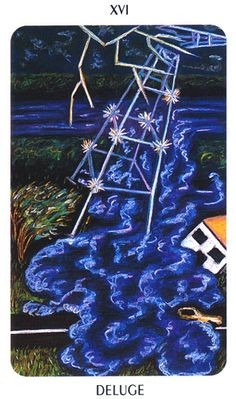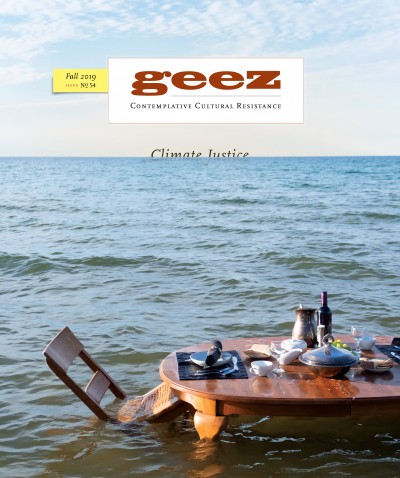A New Afrikan Speaks on Climate

"Deluge" Credit: Louis Martinez
Sometimes I give tarot readings. Rarely, if ever, for others.
^Will See reads his piece as part of Geez Out Loud. The audio is an exact reading of the written article.
It’s a practice I do for myself occasionally when I want to ask a question of a Power beyond my limited conscious mind.
I have a deck that I like. The New Orleans Voodoo Tarot Deck by Louis Martinez. These images and the corresponding descriptions feel ancestral yet present, African and at the same time, diasporic.
As I think of writing for the climate justice issue of this beloved magazine dedicated to faith, justice, and spirit, a single card stays on my mind.
XVI: the Deluge
The guidebook gives two interpretations that have stuck with me for years. First, the flood does not wipe away everything; looking deeper, it is wiping away that which is impermanent.
Second, water often represents emotions. This card can call for an overpouring of emotions beyond the ordinary or what is thought to be safe.
These are the days in which we live. Flooding and storms are wiping away property and forcing relocations. Many are experiencing climate grief from the uncertainty of how much will be destroyed and the likelihood that life won’t be what was expected.
Handling this Voodoo deck has brought me into my own relationship with African Traditional Spiritual Systems (Ifa). Working in environmental justice with Detroit, Michigan’s East Michigan Environmental Action Council and the Climate Justice Alliance, I have been exposed to Indigenous leaders such as Jihan Gearon who led the Black Mesa Water Coalition for many years. Something she said at a national climate conference in 2014 stays on my mind.
For her Diné people, making a Just Transition involves more than just income and jobs. It must also involve holding fast to ancestral ways of life and revitalizing traditional ways of providing for family and community.
The deluge has begun and Black Mesa Water Coalition and the Diné people are investigating what is worth holding onto and what can be swept away.
I resonated strongly with this ancestral vision of a Just Transition framework even though it is unfortunately too rare, even in African-American climate justice visions.
The conundrum of our times is that it is not the drop-outs and those considered “losers” at the margins who are creating the environmental crises we must face. It is the graduates of this system’s finest business, law, and policy schools; the generals of the military academies; the professors and directors of education who are accelerating the crisis through their mastery of ongoing production and consumption.
The leadership to make these changes isn’t going to come from within these institutions. They are too caught up in maintaining and managing their material bases; too caught up in fundraising and upkeep to lead people away from the status quo and towards that which can save lives and save souls.
I believe the way forward is going to come from the grassroots. Specifically, it will come from the leadership of Indigenous and African communities that have already strategically survived hundreds of years of economic decimation, ecological terrorism, and both military and covert warfare.
Right now our people are dependent upon the corporations for our daily necessities. We’re dependent on corporate communications for the images that define us and serve as collective reference points.
In places like Detroit where the economy is unwilling or unable to provide, there are possibilities. Still, it’s going to take time and creative intentionality to transition our people from corporate dependence to collective interdependence.
The thing is, this is the work of generations, and we do not even know what the next three decades will bring. To me, the most resonant activism is that which frees up the next generation from the conditioning we were exposed to, which our parents thought would give us better lives.
Detroit hip hop has the Baba Gang and Dad Raps. We use social media platforms for parents to exchange about our “village mentality.” Our kids learn to care for animals, identify plants growing wild, and think nothing of seeing gardens, chickens, and geese in Detroit ’hoods. Our organizing work holds space for our children to run and play with each other while soaking in the speeches, lectures, and behaviours we model into their subconsciousnesses. We are actively and intentionally creating culture.
Kaela Wabanimkee-Harris, an Anishinaabe comrade, social worker, educator, and culture worker, says we have a choice as a society to follow the material or the sacred.
Most of the United States is removed from the sense of the sacred and view nature as a “resource” or a “commodity” that needs to be developed or exploited for primarily economic purposes. Even the language of justice, affordability, and equity too often fails in making relationship with the elements.
Prof. James Small, Pan-African activist, speaks of traditional African spirituality when he says, “What we call the forces of nature exist in all human beings.” Traditional African religious systems (and Diasporic systems such as Lucumí, Candomblé, Santería) have a fundamental sense of the sacred spirit of the natural world and have developed technologies for people to connect with this sacredness.
We need to listen to our bodies and the intergenerational grief we are carrying to hear new life possibilities speak to us.
We need to listen to the winds, the storms, the trees, and the animals. They embody messages of the earth in how they move. Through collective care, we can slow our lives down enough to hear these instuitions. In intentional caring ways, we can free each other from the non-stop tyranny of making a living in capitalist society.
This world is being swept away in a multitude of deluges. The earth is speaking its pain, and it hurts so much to hear it.
For those who like Biblical language, I think of how the deluge of the Red Sea helped the Israelites get free of their royal enslavers and begin their exodus process, starting with what was at first only known terrifyingly as wilderness.
We have to help our people transition away from the behaviours that created these crises. We have to protect our people from the systems that continue to denigrate us and say our lives don’t matter.
What can you do so your people depend on community security and not on cop calling? What food can you grow so that it’s no longer chain stores that feed your hunger but instead meals with ingredients from your local soils? How can you help resource or promote your local truth-tellers and dream-weavers ? What resources can you liberate from exploitative corporations to redistribute to friends and neighbours? What skills can you teach to the children around you or what gatherings can you host to weave a deeper knowing of one another?
Our Just Transition demands not only new ways of making a living but new relationship with our life force, with living itself. It is time to create collective work, transformative justice, abolition of enslavement, interdependence, and divine imagination. This is a Transition, so we must be gentle with ourselves and others. Not every one of us has been exposed to this work, this possibility, these creative ancient ways of being on planet Earth.
Some of what we are here to learn is very old but it is as present, as urgent, as right now
as crashing waves
hunger pangs
and police bullets.
Will See is an MC, spoken word poet, and New Afrikan cultural organizer in Detroit, Michigan. He is passionate about making soundtracks of resistance that touch mind, body, and spirit.
Image credit: XVI: the Deluge card from The New Orleans Voodoo Tarot Deck by Louis Martinez.



Start the Discussion